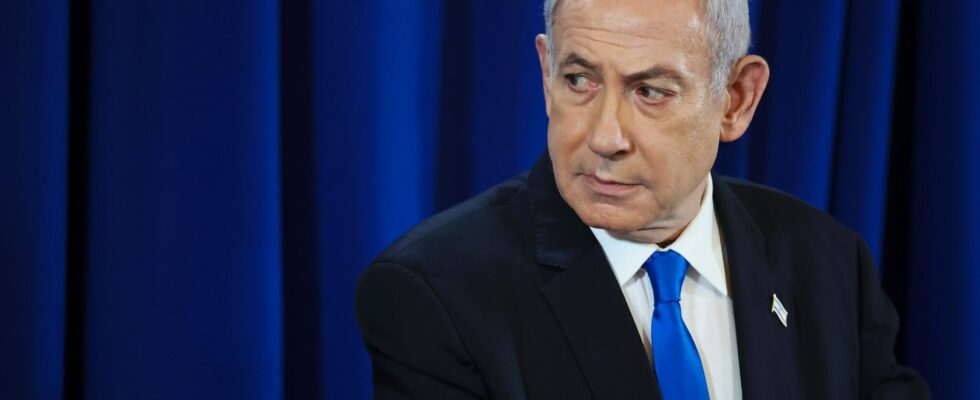“When Iran is finally free, and this moment will arrive much sooner than we think, everything will be different,” declared, in a barely veiled threat, Benjamin Netanyahu, in a video addressed on September 30 to the Iranians , in which he castigated the “fanatical theocrats” at the head of the country. Emboldened by his military successes against Hamas (in Gaza) and Hezbollah (in Lebanon), will the Israeli Prime Minister want to continue his momentum by attacking his most powerful enemy, Iran, even if it means risking war? regional?
After the elimination of the leader of Hezbollah, Hassan Nasrallah, and the Israeli offensive in Lebanon to further weaken the Lebanese militia, such an operation, which still seemed unthinkable a few weeks ago, is now one of the possible scenarios. “For Netanyahu, the real problem is Iran. For years he has been warning about the nuclear threat that this country represents. Today, he believes that there is a window of opportunity to resolve the question of the Tehran regime and annihilate its nuclear program”, underlines Amélie Ferey, researcher at the French Institute of International Relations (Ifri).
For the moment, Israel is preparing its response, after having suffered the sending by Iran of some 180 ballistic missiles on October 1. And the United States clearly stood by him. “This attack [de missiles iraniens] will have serious consequences and we will work with Israel to ensure that this is the case,” insisted Jake Sullivan, the security adviser at the White House. “Make no mistake, the United States fully supports , fully, fully Israel,” added Joe Biden.
Strikes on Iranian oil sites ‘under discussion’
To what extent will the United States hold back Israel’s arm? “Washington is not even making an effort to prevent retaliation. They are trying to think with the Israelis about the targets and the implications of hitting nuclear sites and economic infrastructure,” explains Aaron David Miller, former American diplomat in the Middle East and analyst at the Carnegie Endowment for International Peace think tank in Washington. Asked whether the United States would support an attack by Israel on Iran’s oil installations, the American president responded this week that the subject was “under discussion” – which caused the price of a barrel of oil to jump. But he said he would not support IDF strikes against Iranian nuclear sites.
“In my opinion, the Israelis will primarily target, initially, the command posts of the Iranian Revolutionary Guards, ballistic missile launch sites, weapons depots and a whole series of conventional targets,” continues Aaron David Miller. And if the Iranians retaliate strongly, the Israelis will identify other targets, including economic infrastructure and perhaps nuclear sites. And I don’t think the Biden administration will stop them.
Historic moment
Nuclear sites, however, would be particularly difficult to destroy. “The problem is that the program is not only scattered across the country, but also well protected and deeply buried. It would take numerous aircraft raids to defeat the Iranian air defense system, which would expose the Israeli pilots”, specifies Amélie Férey. And the researcher adds: “That does not mean that they are not going to do it. Nor that it is impossible to annihilate the Iranian nuclear program.”
The idea that the moment would perhaps be historic and that it could make it possible to bring down the Iranian regime would no longer be taboo within part of the international community. “The degree of intelligence that the Israelis have on Hezbollah raises the question of the quality of that which they have on the Iranian regime, slips a diplomatic source. This maintains the discourse according to which everything which seemed impossible is no longer so. This ability to persuade us that the equation has perhaps changed, that it is perhaps a historical moment, introduces a doubt, which can possibly explain changes in posture on the Iranian question. among the Americans, but also on the side of France and certain Europeans”. And to add: “This fascination is extremely dangerous, because we end up no longer being afraid of chaos, by telling ourselves that something more favorable to our interests can come out of it.”
On October 2, France condemned at the UN the ballistic missile attacks perpetrated by Iran against Israel. Saying itself “committed to the security of Israel”, it has “mobilized its military resources in the Middle East to counter the Iranian threat”. Concerning Lebanon, Paris also denounces “Israeli airstrikes which have caused an unacceptable number of civilian victims as well as Hezbollah attacks against Israel and its population”, and calls for a “ceasefire” in this country.
A crucial question now is under what circumstances the United States would directly participate in an Israeli offensive in Iran. “We are not there yet. But if we enter into an escalation, it is not difficult to predict that the United States will get involved,” recalls ex-diplomat Aaron David Miller, for whom the Iranian regime is, however, not close to its fall.
.
